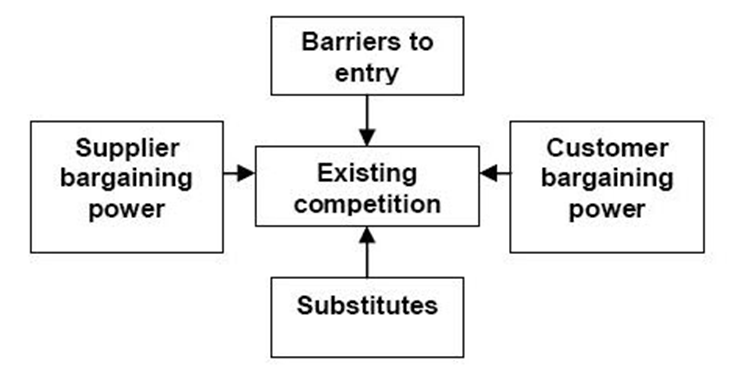Guest-Tek Porter’s Five Forces Analysis
 Porter’s Five Forces is a strategic analytical tool used to analyse the business environment in an industry level. Five forces are comprised of intensity of rivalry among the established firms, bargaining power of buyers, threats of substitutes, bargaining power of suppliers, and the risk of entry by potential competitors (Porter, 2004).
Porter’s Five Forces is a strategic analytical tool used to analyse the business environment in an industry level. Five forces are comprised of intensity of rivalry among the established firms, bargaining power of buyers, threats of substitutes, bargaining power of suppliers, and the risk of entry by potential competitors (Porter, 2004).
The essence of the model is that “the stronger each of these forces is, the more limited is the ability of established companies to raise prices and earn greater profits” (Hill and Jones, 2009, p.43).
Source: Tom Spencer (online)
Intensity of rivalry among the established firms is high in Russian marketplace with a range of local companies such as Moscow City Telephone (MGTS), and VolgaTelecom, as well as multinational companies operating in Russia that include VimpelCom, Golden Telecom and others.
Bargaining power of buyers is significant in the Russian marketplace due to the increased level of offers for private and commercial broadband services. In other words, potential and current customers of broadband companies have a wide range of companies to choose from; therefore they possess significant bargaining power in commercial interactions with broadband suppliers.
Threats of substitute products and services are low for broadband companies. This is because the convenience hotels offer to their customers that involve providing access to the internet in an effective manner are difficult to substitute with alternative products and services.
Bargaining power of suppliers is considered to be moderate for Guest-Tek operations in Russia. Guest-Tek suppliers mainly include global technology manufacturers like IBM MicroElectronics, Sony, PMC Consumer Electronics and others. The bargaining power of such companies is not significant due to the fact that the level of competition in technology manufacturing industry is highly intensifying and Guest-Tek can change its suppliers with minimum or no inconveniences if such necessity arises.
Risk of entry by potential competitors is high in broadband industry in Russia. This is because despite the current level of competition within the industry there is a great demand within the market that yet to satisfied. Moreover, the broadband sector is developing in fast paces in Russia that can be seen from the following table:
| Broadband Sector | 2009 | 2010 |
| Fixed broadband subscribers (thousand) | 10,630 | 14,000 |
| Fixed broadband penetration rate | 7% | 10% |
| Mobile broadband penetration rate | 1% | 2% |
Source: BuddeComm (online, 2011)
In addition, the level of financial investments and expertise that are necessary in order to enter the industry can be afforded by a great number of companies and individual entrepreneurs.

